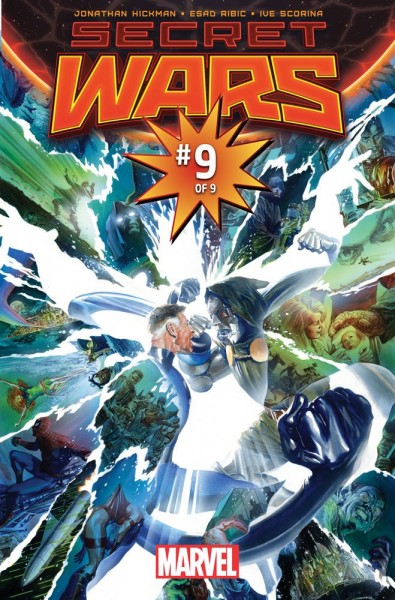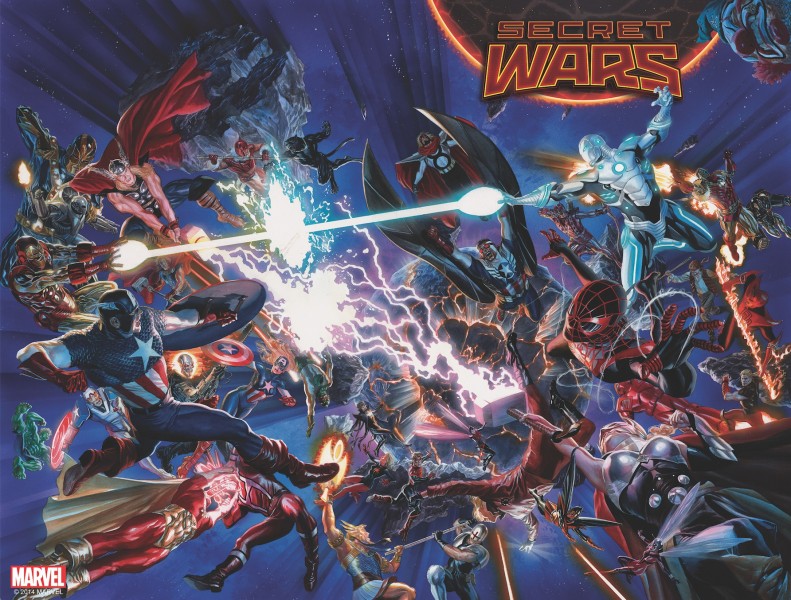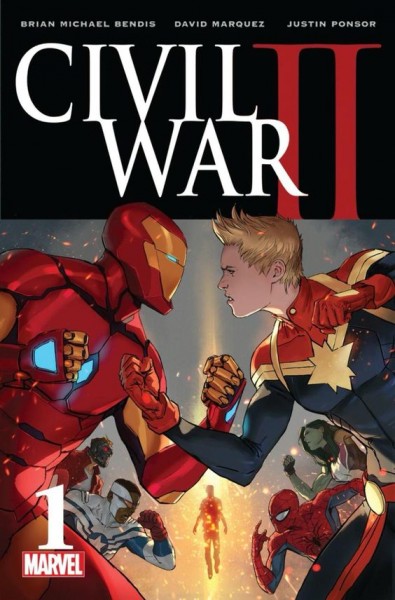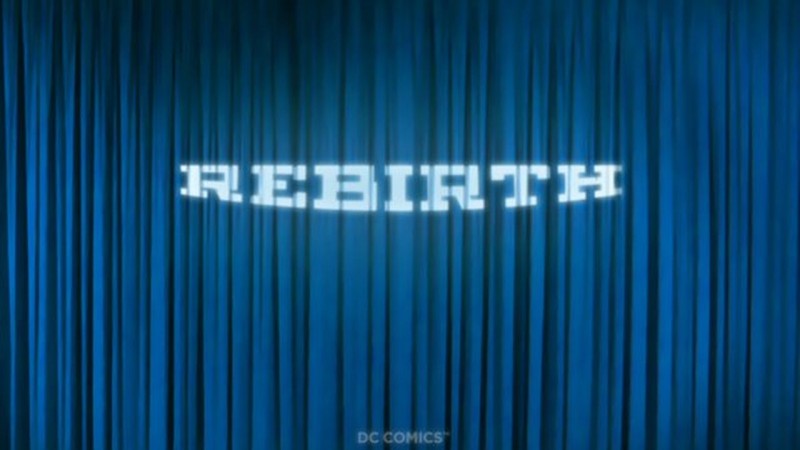Are Event Comic Book Crossovers Necessary?
Marvel Comics just released a comic called
Avengers Standoff: Welcome to Pleasant Hill, written by Nick Spencer with art from Mark Bagley. It was largely un-hyped, which is unusual because it is a crossover. It is going to be a sort of mini-event that crosses over
Avengers, Captain America and
S.H.I.E.L.D. titles. These are the type of smaller crossovers that began in X-Men comic books but are rarer in recent years. Now event comic books tend to be universe-spanning comics that take a number of issues and feature many tie-in books. However, many fans ask at conventions and on message boards if there will ever be an end to event comic crossovers and if they are really necessary?

Even with
Avengers Standoff: Welcome to Pleasant Hill, large, line-wide event comics are still the norm in the industry. Marvel recently wrapped up the nine issue
Secret Wars, a series that combined many of the various multiverses into the main Marvel Universe. Look over at DC Comics, and you can see discussion of their upcoming relaunch called “Rebirth.” In many ways, though, Rebirth is something different. So far, it appears that it will be more of a reset than a long, integrated story involving most of the characters. In fact, DC has not been doing as many of the line-wide events in the past few years. Instead, they have been doing focused crossovers, such as across Batman books or Justice League titles.
So why do some fans dislike event comics or want fewer of them? On one hand, many fans have a fondness for certain events, such as the original
Secret Wars or DC’s
Crisis on Infinite Earths. Looking back at those events actually is a good way to understand some fans’ dissatisfaction with events. The event comics of the 1980s were relatively rare, so they felt special and significant to continuity. Now, there are generally major universe-wide crossovers each summer. This causes what is frequently called “event fatigue,” a feeling that each crossover is not really special or important since there will soon be a build-up to the next one.

For many, there is also unhappiness that these stories are not worthy of the hype generated for them. Some fans do not like that the tie-in issues mean spending a lot of money to get the complete story or if the tie-ins are less essential, then they are not very important issues. Still, other fans dislike how regular series are interrupted by build-up or tie-ins, creating issues that are fundamentally different from the usual tone or concerns of the series. So there are many different reasons why some fans dislike event crossovers and would prefer them to stop. That may not happen any time soon, though.
Event comics do not exist in a vacuum. Marvel was certainly trying to accomplish some logistical things within their universe through
Secret Wars – bring Miles Morales into the main universe and offering a reason for the end of the Fantastic Four among them – but even if they did not have those goals, Marvel still would have put out some type of crossover. For example,
Axis really served no larger story purpose other than to springboard
Superior Iron Man. However, the real purpose of
Axis,
Original Sin,
Fear Itself,
Secret Wars and any other event comic is a boost in sales. If event comics did not sell, Marvel would stop releasing them. Yet the numbers for
Secret Wars were very good, and it was one of the best-selling series of the year. All eight issues published in 2015 were in the
top 30 best-selling issues of the year, with
Secret Wars #1 the second best seller of the year, after
Star Wars #1.

Marvel frequently swats away concern about event comic crossovers, pointing to the sales of the titles as evidence that fans do want the series, and claiming that the complaints about event comics are a vocal minority. That may be true, but the importance of
Secret Wars was apparent to many fans, and not every event will have that. The upcoming
Civil War II will be an interesting case study. Will fans be eager to have a sequel to a series that is only about a decade old?
Civil War II also presents a new possibility as movie/TV version of Marvel and DC properties become more prevalent. Perhaps in the future, event comic crossovers will be adaptations or related to movie events, like how
Civil War II loosely connects to
Captain America: Civil War. Come 2018, I think we can expect some sort of
Avengers: Infinity Wars title(s) at Marvel Comics.
It is a fairly basic concept that comic book publishers need to make money, not just to pay bills and creators, but to justify their existence to larger parent companies. At this point, event comics still (for the most part) sell well, and that means an overall boost to year-end publishing sales figures. So I think we can assume that these types of series will not go away soon, especially at Marvel, which has churned them out annually since the success of the first
Civil War. DC has a history with event mini-series as well. However, since they have mostly not engaged in line-wide crossovers since the “New 52” reboot, it will be interesting to see how much they use the strategy after Rebirth.

While many fans complain about the frequency of event comic crossovers and/or their lack of quality (even if they buy the issues), realistic fans should realize that this is just a facet of the industry now. Gone are the days when issues could sell a million copies. Each year publishers and retailers strategize to figure out how to sell as many copies of comics as they can. For now, event comics are a useful tool for publishers to sell comics and make money, and so they will continue. Fans can be vocal if they dislike the trend, but really the only way that event comics will stop is if they are unsuccessful. So if you are one of those fans who wants fewer events, vote with your dollars. If recent trends continue, though, I wouldn't expect event comic crossovers to end in the near future.
 Even with Avengers Standoff: Welcome to Pleasant Hill, large, line-wide event comics are still the norm in the industry. Marvel recently wrapped up the nine issue Secret Wars, a series that combined many of the various multiverses into the main Marvel Universe. Look over at DC Comics, and you can see discussion of their upcoming relaunch called “Rebirth.” In many ways, though, Rebirth is something different. So far, it appears that it will be more of a reset than a long, integrated story involving most of the characters. In fact, DC has not been doing as many of the line-wide events in the past few years. Instead, they have been doing focused crossovers, such as across Batman books or Justice League titles.
So why do some fans dislike event comics or want fewer of them? On one hand, many fans have a fondness for certain events, such as the original Secret Wars or DC’s Crisis on Infinite Earths. Looking back at those events actually is a good way to understand some fans’ dissatisfaction with events. The event comics of the 1980s were relatively rare, so they felt special and significant to continuity. Now, there are generally major universe-wide crossovers each summer. This causes what is frequently called “event fatigue,” a feeling that each crossover is not really special or important since there will soon be a build-up to the next one.
Even with Avengers Standoff: Welcome to Pleasant Hill, large, line-wide event comics are still the norm in the industry. Marvel recently wrapped up the nine issue Secret Wars, a series that combined many of the various multiverses into the main Marvel Universe. Look over at DC Comics, and you can see discussion of their upcoming relaunch called “Rebirth.” In many ways, though, Rebirth is something different. So far, it appears that it will be more of a reset than a long, integrated story involving most of the characters. In fact, DC has not been doing as many of the line-wide events in the past few years. Instead, they have been doing focused crossovers, such as across Batman books or Justice League titles.
So why do some fans dislike event comics or want fewer of them? On one hand, many fans have a fondness for certain events, such as the original Secret Wars or DC’s Crisis on Infinite Earths. Looking back at those events actually is a good way to understand some fans’ dissatisfaction with events. The event comics of the 1980s were relatively rare, so they felt special and significant to continuity. Now, there are generally major universe-wide crossovers each summer. This causes what is frequently called “event fatigue,” a feeling that each crossover is not really special or important since there will soon be a build-up to the next one.
 For many, there is also unhappiness that these stories are not worthy of the hype generated for them. Some fans do not like that the tie-in issues mean spending a lot of money to get the complete story or if the tie-ins are less essential, then they are not very important issues. Still, other fans dislike how regular series are interrupted by build-up or tie-ins, creating issues that are fundamentally different from the usual tone or concerns of the series. So there are many different reasons why some fans dislike event crossovers and would prefer them to stop. That may not happen any time soon, though.
Event comics do not exist in a vacuum. Marvel was certainly trying to accomplish some logistical things within their universe through Secret Wars – bring Miles Morales into the main universe and offering a reason for the end of the Fantastic Four among them – but even if they did not have those goals, Marvel still would have put out some type of crossover. For example, Axis really served no larger story purpose other than to springboard Superior Iron Man. However, the real purpose of Axis, Original Sin, Fear Itself, Secret Wars and any other event comic is a boost in sales. If event comics did not sell, Marvel would stop releasing them. Yet the numbers for Secret Wars were very good, and it was one of the best-selling series of the year. All eight issues published in 2015 were in the top 30 best-selling issues of the year, with Secret Wars #1 the second best seller of the year, after Star Wars #1.
For many, there is also unhappiness that these stories are not worthy of the hype generated for them. Some fans do not like that the tie-in issues mean spending a lot of money to get the complete story or if the tie-ins are less essential, then they are not very important issues. Still, other fans dislike how regular series are interrupted by build-up or tie-ins, creating issues that are fundamentally different from the usual tone or concerns of the series. So there are many different reasons why some fans dislike event crossovers and would prefer them to stop. That may not happen any time soon, though.
Event comics do not exist in a vacuum. Marvel was certainly trying to accomplish some logistical things within their universe through Secret Wars – bring Miles Morales into the main universe and offering a reason for the end of the Fantastic Four among them – but even if they did not have those goals, Marvel still would have put out some type of crossover. For example, Axis really served no larger story purpose other than to springboard Superior Iron Man. However, the real purpose of Axis, Original Sin, Fear Itself, Secret Wars and any other event comic is a boost in sales. If event comics did not sell, Marvel would stop releasing them. Yet the numbers for Secret Wars were very good, and it was one of the best-selling series of the year. All eight issues published in 2015 were in the top 30 best-selling issues of the year, with Secret Wars #1 the second best seller of the year, after Star Wars #1.
 Marvel frequently swats away concern about event comic crossovers, pointing to the sales of the titles as evidence that fans do want the series, and claiming that the complaints about event comics are a vocal minority. That may be true, but the importance of Secret Wars was apparent to many fans, and not every event will have that. The upcoming Civil War II will be an interesting case study. Will fans be eager to have a sequel to a series that is only about a decade old? Civil War II also presents a new possibility as movie/TV version of Marvel and DC properties become more prevalent. Perhaps in the future, event comic crossovers will be adaptations or related to movie events, like how Civil War II loosely connects to Captain America: Civil War. Come 2018, I think we can expect some sort of Avengers: Infinity Wars title(s) at Marvel Comics.
It is a fairly basic concept that comic book publishers need to make money, not just to pay bills and creators, but to justify their existence to larger parent companies. At this point, event comics still (for the most part) sell well, and that means an overall boost to year-end publishing sales figures. So I think we can assume that these types of series will not go away soon, especially at Marvel, which has churned them out annually since the success of the first Civil War. DC has a history with event mini-series as well. However, since they have mostly not engaged in line-wide crossovers since the “New 52” reboot, it will be interesting to see how much they use the strategy after Rebirth.
Marvel frequently swats away concern about event comic crossovers, pointing to the sales of the titles as evidence that fans do want the series, and claiming that the complaints about event comics are a vocal minority. That may be true, but the importance of Secret Wars was apparent to many fans, and not every event will have that. The upcoming Civil War II will be an interesting case study. Will fans be eager to have a sequel to a series that is only about a decade old? Civil War II also presents a new possibility as movie/TV version of Marvel and DC properties become more prevalent. Perhaps in the future, event comic crossovers will be adaptations or related to movie events, like how Civil War II loosely connects to Captain America: Civil War. Come 2018, I think we can expect some sort of Avengers: Infinity Wars title(s) at Marvel Comics.
It is a fairly basic concept that comic book publishers need to make money, not just to pay bills and creators, but to justify their existence to larger parent companies. At this point, event comics still (for the most part) sell well, and that means an overall boost to year-end publishing sales figures. So I think we can assume that these types of series will not go away soon, especially at Marvel, which has churned them out annually since the success of the first Civil War. DC has a history with event mini-series as well. However, since they have mostly not engaged in line-wide crossovers since the “New 52” reboot, it will be interesting to see how much they use the strategy after Rebirth.
 While many fans complain about the frequency of event comic crossovers and/or their lack of quality (even if they buy the issues), realistic fans should realize that this is just a facet of the industry now. Gone are the days when issues could sell a million copies. Each year publishers and retailers strategize to figure out how to sell as many copies of comics as they can. For now, event comics are a useful tool for publishers to sell comics and make money, and so they will continue. Fans can be vocal if they dislike the trend, but really the only way that event comics will stop is if they are unsuccessful. So if you are one of those fans who wants fewer events, vote with your dollars. If recent trends continue, though, I wouldn't expect event comic crossovers to end in the near future.
While many fans complain about the frequency of event comic crossovers and/or their lack of quality (even if they buy the issues), realistic fans should realize that this is just a facet of the industry now. Gone are the days when issues could sell a million copies. Each year publishers and retailers strategize to figure out how to sell as many copies of comics as they can. For now, event comics are a useful tool for publishers to sell comics and make money, and so they will continue. Fans can be vocal if they dislike the trend, but really the only way that event comics will stop is if they are unsuccessful. So if you are one of those fans who wants fewer events, vote with your dollars. If recent trends continue, though, I wouldn't expect event comic crossovers to end in the near future.